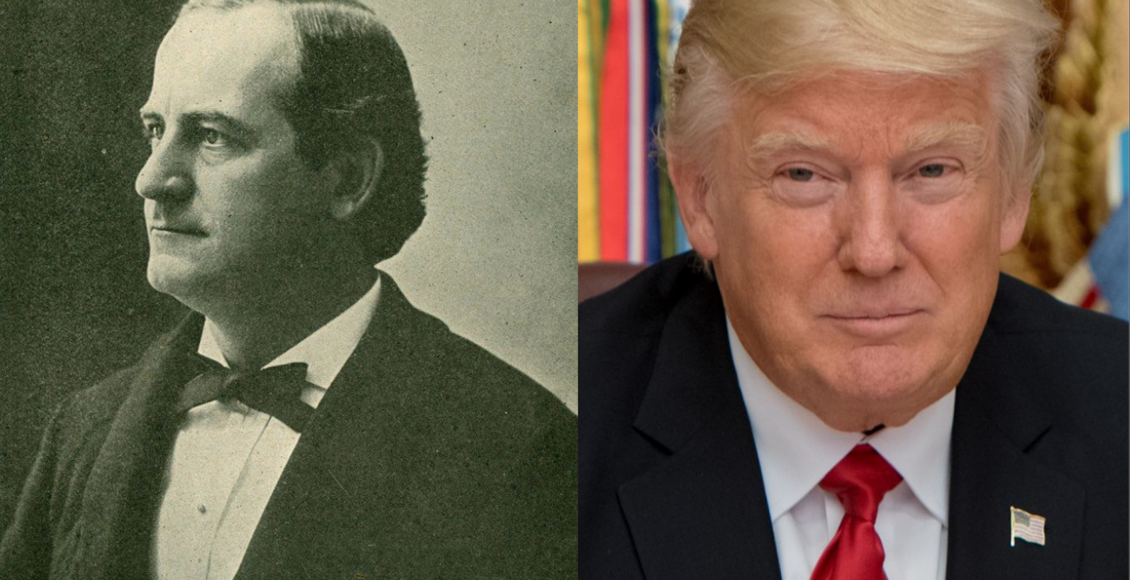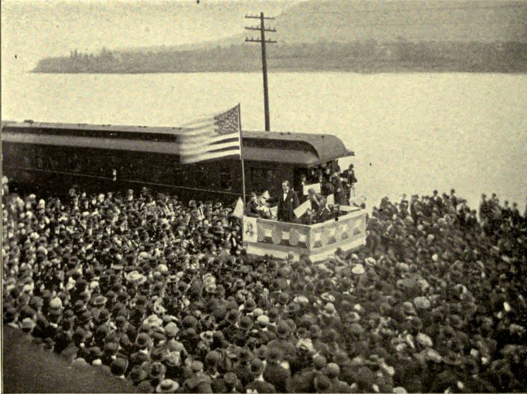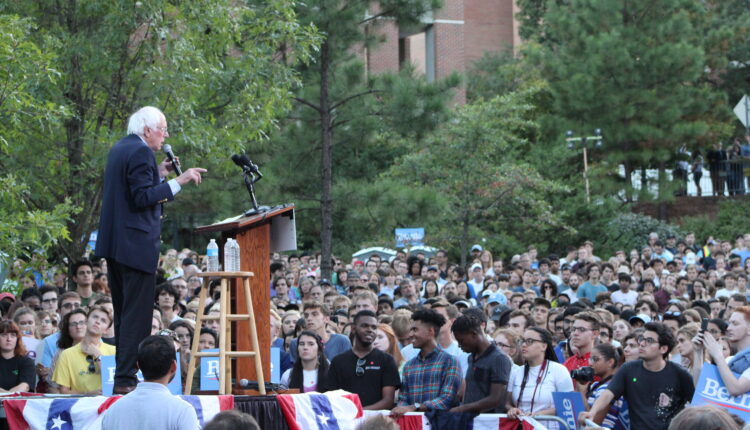Populism, Progressivism, and the Presidency: The Elections of 1896 and 2020

Donald Trump’s 2016 election campaign rode a wave of populism that swept the United States. However, populism has deep roots in American politics that stretch back more than a hundred years. In the 1890s, the People’s Party, also known as the Populist Party, was founded in rural America and united Americans who were disillusioned by the uneven benefits of 19th-century economic growth. They campaigned on an economic platform that prioritized the interests of rural Americans. Similarly, Donald Trump’s populism harnessed the energy of working-class voters who felt left behind by 21st-century economic progress. In 1896, the Populists fought hard to dethrone the elitist Republican Party, but ultimately lost a strong presidential campaign. Although the Populists lost to the Republican nominee William McKinley, their efforts in the 1890s sowed the seeds for the American Progressive Era of the early 1900s — an era that ushered in significant political reform and redistribution of wealth. Given the inextricable links between the populism of the 1890s and the 2010s, it is certainly possible that the 2020 presidential election could also set the stage for a new wave of American progressivism.
Populism in 1896
The late-19th century was the age of the robber baron, rapid industrialization, and Western expansionism. Bankers in New York and New England were benefiting greatly from an increase in trade and investment in large part facilitated by the United States’ move to back their dollar with gold. Meanwhile, the South was left in shambles following the Civil War, and farmers in the West were amassing massive debts as they funded new agricultural ventures. The appreciation of the dollar under the gold standard made it harder for rural Americans to pay off their debts and kept domestic prices for their products low. These rural, pro-deflation, agrarian groups with shared economic frustrations eventually coalesced and created the People’s Party in 1892. They elected a limited number of members of Congress and senators throughout the 1890s. They even had a close brush with presidential power when they jointly nominated William Jennings Bryan with the Democrats in 1896 for the presidency.

Bryan mounted a fearless barnstorming campaign focused on amassing the support of rural Americans against the Northeastern elite. He argued that the government ought to regulate large corporations, especially monopolistic railways, which exploited farmers for the transportation costs of agricultural products. Accordingly, a recent study from the National Economic Research Bureau showed that Bryan’s vote share was highest in counties with high interest rates and low railroad competition. While Bryan united populist movements in the West and South, McKinley continued to represent corporate elite interests. As a result, the 1896 election became extremely polarized, and partisan loyalty reached a peak that would not be matched until the 2010s. However, given that his supporters held relatively little capital compared to McKinley’s backers, the Bryan campaign was severely limited in its fundraising abilities. Indeed, McKinley’s campaign raised a staggering $3 million USD from Wall Street bankers who sought to protect their monetary interests and the gold standard. Meanwhile, Bryan’s capital-poor supporters mustered up a mere $500 000 USD. McKinley’s spendings made 1896 the most expensive election in American history relative to GDP, a record that still stands to this day. In an age of rampant inequality, populism stole the spotlight in a battle pitting the elite against anti-elitists. Although the Populists lost the White House in 1896, their political action set the stage for an era of American Progressivism in the following years.
Trumpism in 2016
In the lead-up to the 2016 election, large swaths of the American population were frustrated by shrinking local economic output. Similar to 1896, there was also disillusionment among the American working class regarding the unequal benefits of 21st-century globalization. Wall Street players were bailed out after the financial crisis, while millions of working-class jobs were lost indefinitely. However, 120 years after William Jennings Bryan ran for office, populist forces won the White House with Donald Trump in 2016. President Trump embraced the anger of the American working class and ran an energized campaign against what he portrayed as an elitist Democratic Party. Trump garnered important support among white non-college voters in the Rust Belt and Midwest, winning swing states such as Pennsylvania, Wisconsin, and Michigan. Similar to the 1896 Populists, the Trump campaign drew in voters that were left behind by American economic progress. Moreover, Trump’s “America First” mantra represented a populist pivot away from global economic cooperation akin to Bryan’s push to take the dollar off of the internationally-recognized gold standard in 1896. Despite the success of right-wing populism in 2016, a similar movement also began to develop on the left under the leadership of political figures such as Bernie Sanders.

Populism and the Seeds of progressivism
Although the 1896 election fell in the Northeastern elites’ favour, the wave of populism under Bryan helped lay the foundation for a new era of American Progressivism in the early 20th century. According to political scientists Julia Azari and Marc Hetherington, “when political conflict between parties becomes polarized, the same polarizing issues tend to become divisive within parties as well.” In the years leading up to and following 1896, Teddy Roosevelt rose within Republican ranks and advocated for polarizing progressive policies. As Governor of New York, Roosevelt fought hard to impose corporate taxes and increase government regulation despite being a member of a historically anti-regulation party. When President McKinley was assassinated in 1901, then-Vice-President Teddy Roosevelt ascended to the presidency and began to pursue federal progressivism. Roosevelt’s landmark policies were outlined in his Square Deal, which focused on controlling corporations, protecting consumers, and conserving natural resources. Although he was part of McKinley’s Republican Party, Roosevelt harnessed the people’s energy to promote social justice and equal economic opportunity. The subsequent Progressive Era saw increased corporate regulation and social justice while maintaining the core tenets of American capitalism. Evidently, Bryan’s populism was unsuccessful in the short-term, but it significantly transformed American political dialogue. In essence, the populism of the late 19th-century set the stage for progressivism within the framework of a once-elitist Republican Party.
In some sense, the 1896 election mirrors the ongoing fight between Trump and the Democrats, especially with regard to the hyperpolarization of American politics. However, the real fight in 2020 continues to pit establishment elites against anti-elitist movements. In addition to the economic disillusionment that propelled Trump to victory in 2016, millions of Americans have grown increasingly frustrated with the effects of systemic racism, a rapidly changing climate, and skyrocketing economic inequality during the COVID-19 pandemic. With endorsements from the likes of Bernie Sanders and Alexandria Ocasio-Cortez, Joe Biden is addressing the polarization within his own party and taking advantage of left-wing populist energy while maintaining many of his centrist beliefs. A Biden win won’t single-handedly solve America’s problems. Still, it could pave the road for a Roosevelt-like figure — perhaps Kamala Harris — to heal the polarization and inequality that has plagued 21st-century American politics. A Democratic victory in 2020 could lay the foundation for a long-term transformation in American politics, similar to what happened in the years following 1896.
Featured Images: “William Jennings Bryan (1860-1925)” by Political Graveyard is licensed under CC BY 2.0. “Donald Trump Pentagon 2017” by Staff Sgt. Jette Carr is in the public domain.
Edited by Chino Ramirez
